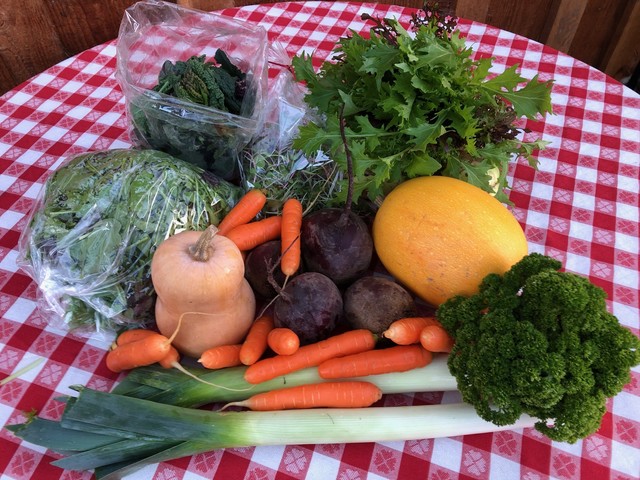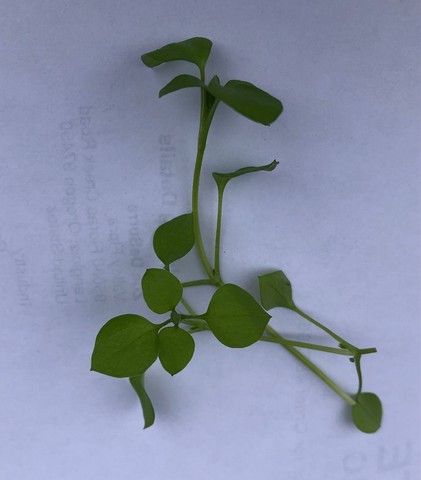What's in the Winter Share this Week:
- Candy Carrots
- Red Beets
- Leeks
- Micro Mix
- Curly Parsley
- Winter Greens (baby arugula, mizuna, tatsoi, mustard, kale)
- Bunched Asian Greens
- Spaghetti Squash - Like most of you, spaghetti squash is not usually the first winter squash I reach for in my kitchen, but out of the blue I had a spurt of spaghetti squash inspiration a few weeks ago. I cut some squash in half and baked them face down in the oven (I always add a good layer of water to the sheet pan to help steam-cook my squash in the oven and prevent sticking). Meanwhile I made up a pressure-cooker batch of homemade chili from our farm-grown pinto beans that I'd soaked the night before. When the spaghettis were done we ladled chili into the cavity of the squash and ate them as spaghetti-chili boats. The spice of the chili played off the sweet mellowness of the squash, and it saved me the effort of having to bake cornbread. It won approval from the whole gang, age 4 to 46. Highly recommend!
- Butternut Squash - last of the season.
- Kohlrabi - still ugly on the outside, still pearly white on the inside. This is it for the season.
On Rotation:
- Spring Raab and Purple Sprouting Broccoli - Bandon members will see a bag of kale & cabbage raab with some purple sprouting broccoli mixed in this week. Raab is the flowering tips of overwintered Brassicas - the final edible gift from our kale plants that have been in the ground for almost a year. It has wonderful, sweet flavor when steamed or sauteed. We usually drizzle it with olive oil and some ume plum vinegar after it comes out of the steamer. It's also fantastic roasted in the oven at 400 degrees with olive oil and salt until you get some crispy browning. Just keep an eye on it so you don't cross the line into blackened raab. It cooks quickly! FYI, we got a new shipment of biobags last week so the raab is packed into a fully compostable/marine degradable wood fiber cello bag. It's been hard to source them, but we've finally found a supplier who can provide an eco option in the volume we need. We'll be using them for all the bagging we can from here on out.
The Ubiquitous Chickweed
Some of you who garden probably recognize this plant, scientific name Stellaria media. Chickweed. Perhaps the most ubiquitous fall/winter/early spring weed we have on the farm, it thrives in cool, moist weather and forms a low-growing succulent mat of greenery capable of swallowing entire plantings of cilantro, onions, greens, lettuce, chicory, carrots, or any other early or late-sown crop that ends up in its path. We spend our fair share of time battling chickweed in the cooler months of the year. If I were to tally up all the hours our crew member, Allen, spent crawling through our onion planting pulling chickweed last spring, it would probably add up to weeks of his life. (Sorry about that, Allen).
You will most definitely find a few sprigs of it in your baby winter greens this week, and probably your bunch greens, too, despite the countless eye-straining hours we spent trying to sort it out of the mix during harvest, wash and bagging this week. The good news is it's entirely edible. Not only that, it's really, really good for you: super high in vitamins, minerals and protein, and it actually tastes good. So why all the painstaking effort to keep it out of the salad mix? Good question. Chickweed is one of those plants that has always belonged in the "weed" category of our farming minds; something we battle so that other cash crops can thrive instead. But little by little I have begun to wonder if it's time for a paradigm shift. A "weed" is purely a human construct. It's "a plant that is not valued where it is growing, usually of vigorous growth, especially one that tends to choke out or overgrow more desirable plants" (thank you Merriam Webster). What if, instead of fighting the chickweed we embraced it? Harvested it? Washed it? Bagged it? Sold it?
We'd be rich!
(And you'd be really healthy!)
One of my favorite seed farmers/organic ag gurus is firebrand Frank Morton. He founded Wild Garden Seed in Philomouth and has dedicated his life to developing regionally adapted, open-pollinated, open source, organic varieties for farm and garden. He's also been a champion of the fight to protect Oregon's world-class, specialty seed-producing Willamette Valley from intrusion by GMO canola production (great article on this issue here). Frank once preached a mighty e-sermon to our farmer listserv about all the virtues of chickweed (this was in response to someone's post about "how do you deal with all the f***ing chickweed on your farm in the winter!?!"). Frank hotly contested that chickweed was nature's gift to our farms, covering and nourishing our soils through the winter, providing early spring forage for hungry pollinators and beneficial insects, AND to top it all off, it tastes great and is way more nutritious than kale! We should all be getting down on our knees and thanking the chickweed gods. And oh by the way, you can buy chickweed seed to INTENTIONALLY PLANT ON YOUR FARM from me, Frank, on my website. Amen.
I think most of us chortled at Frank's sermon that day (gotta love that Frank!) and then promptly hit "delete," cuz after all, what's the second word in chick-weed? Us farmers don't grow weeds, we grow hifalutin, specialty veggie-tables. I bet you money though that, as usual, Frank is ahead of his time. Chickweed will be all over those fancy menus in Portland someday - if it isn't already - maybe under the more elite auspices of "stellaria" at first - and it'll only be a matter of time before the culinary chickweed diaspora spreads down to Curry County. When that day comes and we find ourselves weeding the arugula out of the chickweed bed, I will think of Frank in all his infinite wisdom, vision, genius and foresight as a pioneering ecological seed breeder/farmer and thank him. (And honestly, I kinda hope that day comes sooner than later, cuz man do we have a vigorous patch of chickweed in our winter greenhouses!)
P.S. If you get some chickweed in your greens this week, try it! If you like it, let me know! If you'd like to see more chickweed in your salad in the future, please email me immediately! We could spearhead a reverse diaspora where Coos/Curry county teaches Portland how to eat high on the chickweed hog and yours truly could spend less of her life culling out tiny little delicious tendrils of chickweed in the washtub.


